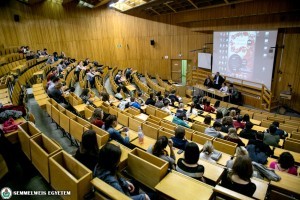 A Students’ forum on the experiences of the recently introduced block courses in Year 5 was held in the NET building. The event was organised by the Students’ Union of the Faculty of Medicine and was attended by Dr. László Hunyady, Dean, Dr. Tamás Masszi, Vice-Dean for General Affairs, Dr. Miklós Molnár, Vice-Dean for Gradual Studies, Gergő Báthori, Vice-President of the Studens’ Union at the Faculty of Medicine and András Szeles, President of ISAS, representing foreign students.
A Students’ forum on the experiences of the recently introduced block courses in Year 5 was held in the NET building. The event was organised by the Students’ Union of the Faculty of Medicine and was attended by Dr. László Hunyady, Dean, Dr. Tamás Masszi, Vice-Dean for General Affairs, Dr. Miklós Molnár, Vice-Dean for Gradual Studies, Gergő Báthori, Vice-President of the Studens’ Union at the Faculty of Medicine and András Szeles, President of ISAS, representing foreign students.
Block courses in Year 5 were introduced at the beginning of the fall semester of the academic year 2015/2016. The idea behind the new system was to enable students to do their clinical practice in one- or two-week-long blocks, thus reducing the time of travel between the different departments and rendering education more comprehensible.
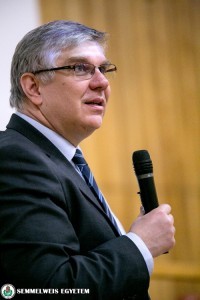 “This brand new system was set up based on the feedback of the students and its organisation was met with a lot of logistical challenges.”, Dr. László Hunyady said.
“This brand new system was set up based on the feedback of the students and its organisation was met with a lot of logistical challenges.”, Dr. László Hunyady said.
The leadership of the faculty is open to the students’ suggestions regarding the block courses; therefore observations and feedback are to be sent to the Dean’s Office.
“Our aim is to improve the quality of practical education by reforming the methodology and the content of the courses. So far the new system has proved to be working well and in case of problems answers are constantly being looked for.”, the Dean said.
One of the main goals is to create more and more skill labs in practical courses. This is supported by the acquisition of new educational aids, such as the recently acquired device at the Department of Urology helping students practise the application of catheters or the equipment aiming at the practice of thoracentesis or cricothyrotomy at the Department of Thoracic Surgery.
The new system is a considerable step towards the standardisation of the medical programme, which is complemented by a so-called competency list that determines what skills and competencies students need to achieve during the practical courses.
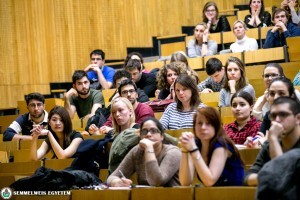 One of the problems that arose during the forum included the possibility to make up for missed lessons. According to Dean Hunyady, at the end of the spring semester they are planning to insert an extra week dedicated only to such activities.
One of the problems that arose during the forum included the possibility to make up for missed lessons. According to Dean Hunyady, at the end of the spring semester they are planning to insert an extra week dedicated only to such activities.
“Certain one-week-long practical courses will be replaced by one night of on-call duty, just like in the case of traumatology practice. This will enable students to get closer to patients, have a more thorough understanding of actual patient care and gain an extra week to make up for missed lessons.
“The Students’ Union would like to make all departments agree on a maximum of 85% attendance rate. Currently the Examination and Studies Regulation sets the attendance rate at a minimum of 75%, however the different departments can decide otherwise. 85% would be ideal because it would allow students time for their scientific activities as well.”, Gergő Báthori said.
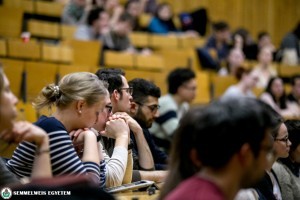 Students also wanted to know why it was not possible to take exams immediately after the block course. According to Dr. László Hunyady it would be a reasonable to do so; however exam sessions in mid-semester would only reduce the number of practical lessons.
Students also wanted to know why it was not possible to take exams immediately after the block course. According to Dr. László Hunyady it would be a reasonable to do so; however exam sessions in mid-semester would only reduce the number of practical lessons.
“Besides, skills acquired during these practical courses should not be forgotten by the end of the semester, therefore exams in mid-semester are not justified.”, Dr. Tamás Masszi said.
Another problem was the theoretical knowledge to be used during practical courses. As practical courses are held at the beginning of the semesters, students’ knowledge in a given field is incomplete.
“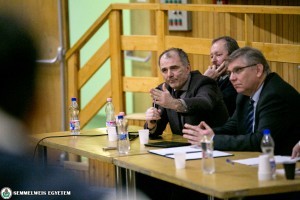 The departments are encouraged to develop e-learning materials which would help students prepare for the practical course. Even if students need to do their practical courses well prepared, it is not essential to know everything from the theoretical course’s syllabus for that particular semester.”, Dr. Tamás Masszi said.
The departments are encouraged to develop e-learning materials which would help students prepare for the practical course. Even if students need to do their practical courses well prepared, it is not essential to know everything from the theoretical course’s syllabus for that particular semester.”, Dr. Tamás Masszi said.
Further goals include the reduction of student numbers in study groups and the introduction of an electronic feedback system that can be accessed anonymously via Neptun.
According to András Szeles, foreign students are grouped based on decision of the Year’s coordinator taking individual requests and needs into consideration, whereas Hungarian students are grouped based on their academic achievements and study tours. Students participating in block courses receive their timetable at the beginning of the semester, which is available on the university’s website on the following link.
“We would like to thank you for attending the forum. We strive to increase the level of education, and believe that the introduction of block courses in practical education is pointing in this direction.”, said Dr. László Hunyady at the closure of the event.
Péter Pogrányi
Photo: Attila Kovács – Semmelweis University
Translated by: Ágnes Raubinek


